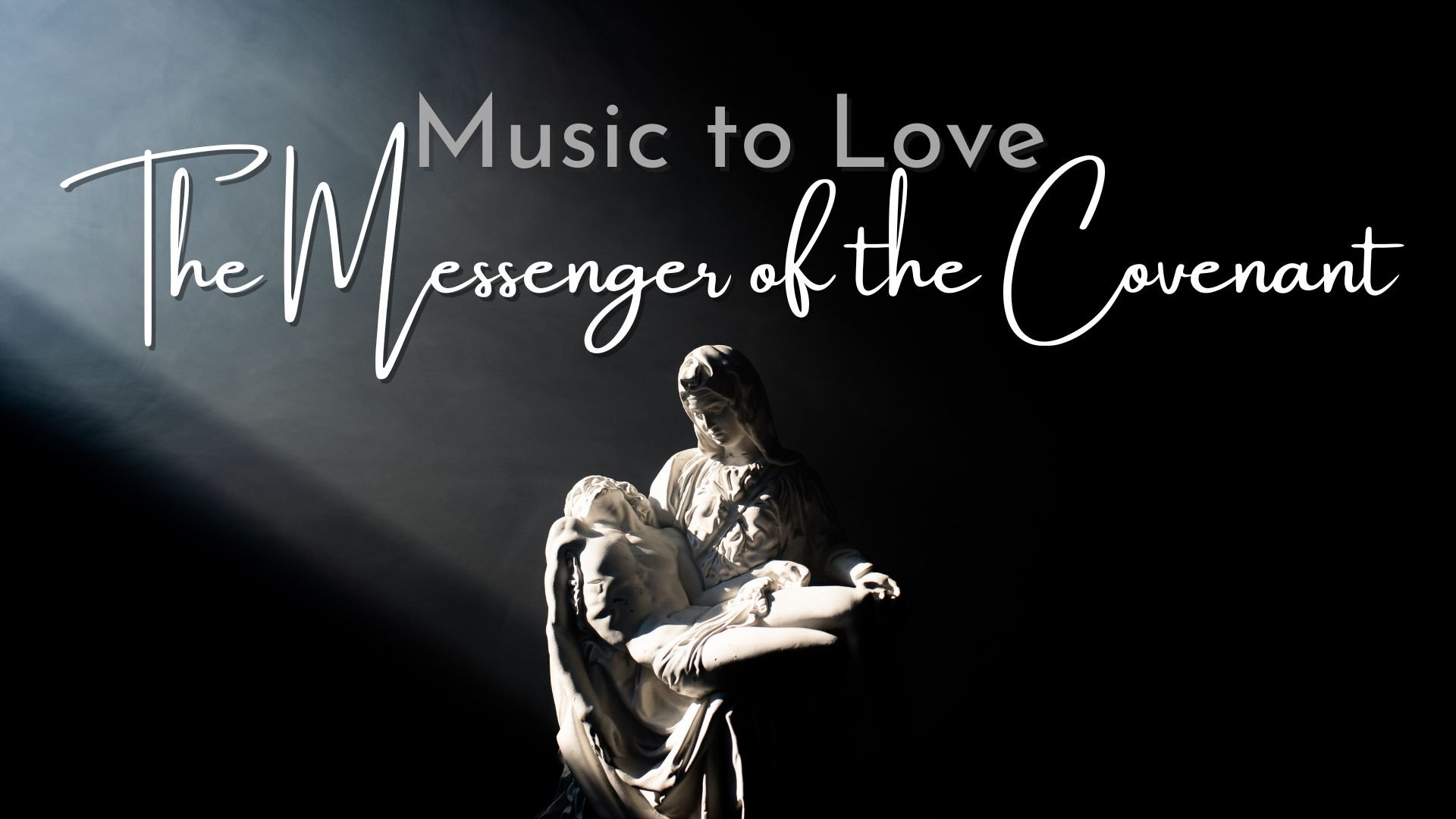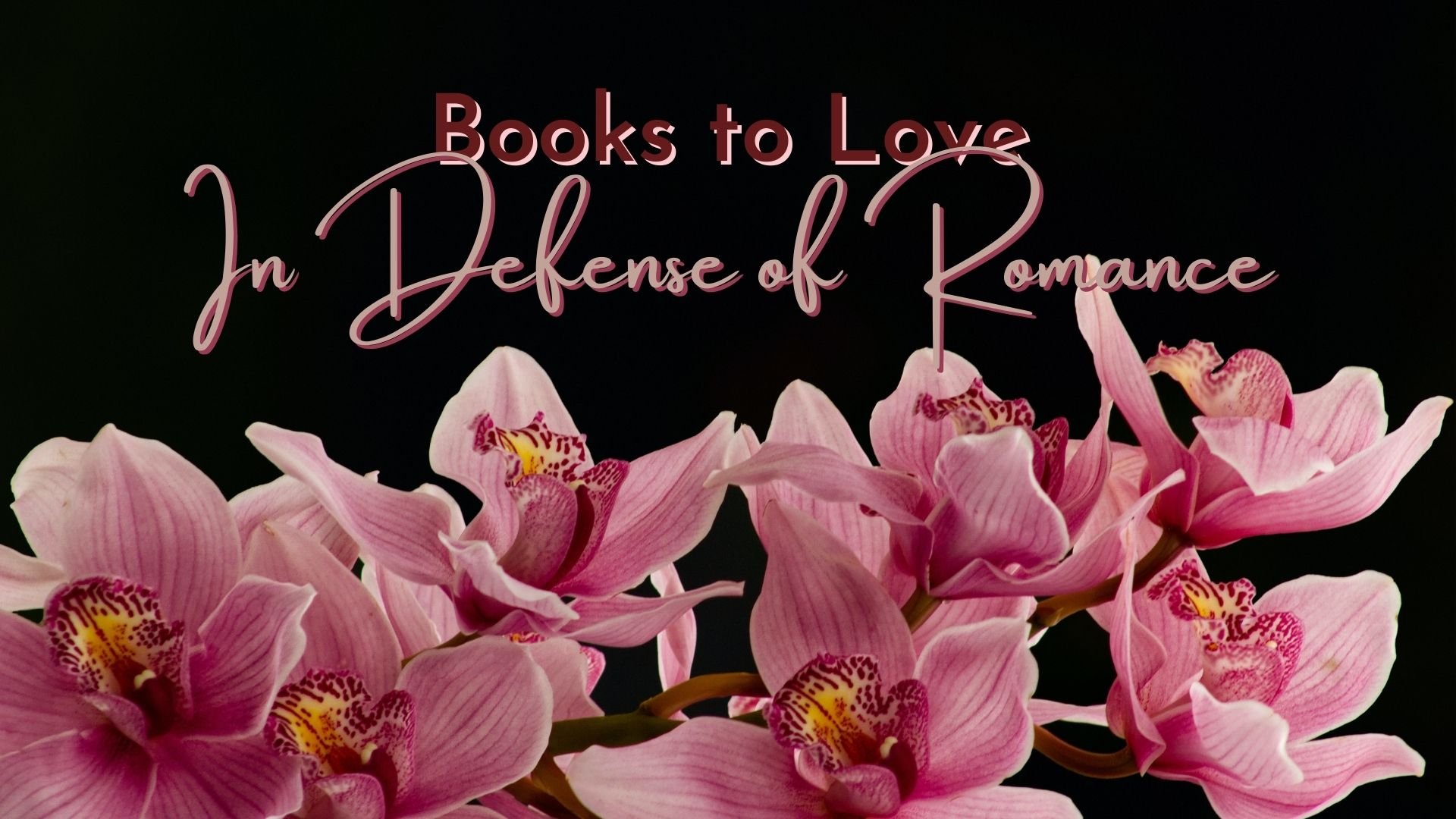Music to Love: The Messenger of the Covenant
Christmastime is here, as Charlie Brown would say. And with it is all the inundation of secularism that can run roughshod over the true meaning of Christmas. Don’t get me wrong. I enjoy all the fun trappings and whatnot. My favorite Christmas mug is a Clare Mackie creation with Santa and his reindeer dancing together like Radio City Rockettes, for goodness sake. But, too often, the real reason we celebrate this time of year with such jubilation and generosity is overlooked, shoved into a corner to be considered for an hour or two at a candlelit Christmas Eve service. Sometimes, it’s overlooked completely. Dismissed. And that’s my reserve when it comes to the cultural appropriation of one of the most preeminent and majestic Holy days in all of Christendom.
Have no fear. I’m not going to go all Ebenezer Scrooge and ba-humbug Christmas movies or Santa and the like. I enjoy each one of those things in turn. Our family has Christmas traditions that don’t always circle around Jesus and his birth. We watch It’s a Wonderful Life every Christmas. A Christmas Carol with Alastair Sim every Christmas Eve. And, of course, as you can see right from previous Christmas posts here at Whiskers on Kittens, our family loves numerous Christmas movies that are not specifically religious.
Yet, as my husband and I are raising our family, we have come to a realization of how important it is to instill reverence in our son. Christmas is a sacred time. A holy time. It celebrates the greatest gift every bestowed on mankind. And we cannot let that penultimate truth get lost in all the hubbub.
So, today, I am sharing a tradition we have in our home which brings Christ to the forefront of Christmas. I hope you take the time to read all the way through this post, and, when applicable, follow the links, so that you, too, can experience the true grandeur of this season.
Handel’s Messiah
This year, while sitting and listening to Messiah, I was captivated by one line from Malachi 3:1:
“The Lord, whom ye seek, shall suddenly come to his temple, even the messenger of the covenant, whom ye delight in: behold, he shall come, saith the Lord of hosts.”
The Messenger of the Covenant. Covenant is something abiding. In the Judeo-Christian faith, it is the basis upon which our faith is built. The covenant between Abraham and God the Father. In Malachi, it’s a foretelling of the coming of Jesus, the Son of God, to the earth. It’s jubilant. A thing in which we delight. A great excitement.
Sitting there in my living room, I felt the full majesty and grandeur of what Christmas is about, and, more so, what the entire plan God the Father had when he created the earth. Family.
And somehow, with Charles Jennens’ libretto and Handel’s oratorio, Messiah captures the entirety of that. It’s poignant. It’s masterful. It’s magnificent. Composed centuries ago, it is still one of the most famous and beloved pieces the world over for Christians and non-Christians alike.
When asked, most people believe Handel wrote the libretto (the lyrics) as well as the orchestra pieces. That is not the case. The libretto was penned by Charles Jennens, a passionate Christian believer and member of the Society for the Propagation of the Gospel. But, Jennens didn’t actually ‘pen’ the libretto; he sat down with his bible and using direct passages out of scripture, presented a composition that 100% Gospel. He believed that presenting the unadulterated Word of God in combination with the right music would communicate its truth and hope to a calcified, increasingly secular world. And when Jennens was finished with his work, he presented it to his friend, George Handel, and asked him to compose an oratorio that would do it justice.
Considering the source— the inspired word of God— that’s a tall order. One does not need to wonder why Handel left it untouched for 18 months. How does one actually attempt to compose music to augment scripture?
Now, a little back story here. At the time when Charles Jennens approached Handel, George Handel was an absolutely rockstar. Whatever he composed was well received. He was massively popular. In essence, he was the Taylor Swift of his time. However, as is the way with any popularity one acquires, there are those who are unhappy, jealous, churlish, and what have you. At this time in George Handel’s life, he found himself in disfavor with some key players within Arts and Culture. Not because of any bad behavior on his part, mind you, but some people felt he was being too ambitious with his work and trying to dominate the musical scene. You know, bad blood.
Then Handel got sick. Nothing too serious, but enough to set him a few pegs down. And, when he recovered, he returned to a scene where he was out of favor and feeling the worse for wear.
Enter Charles Jennens’ libretto. Handel took the manuscript down from the shelf where it had collected dust for the last year and a half and took a real good look at it.
And, as the inspired Word of God is want to do, it inspired. Handel locked himself in his rooms for three weeks, barely eating and drinking, hardly sleeping, in the grip of divine momentum. When he composed the famous Hallelujah chorus, his assistant entered his rooms to find Handel collapsed over his desk in tears. When asked why he was crying, Handel said, “I think I did see heaven open, and the very face of God.”
When those three weeks were over, Handel emerged with the oratorio we know today as Messiah. In three parts, Handel and Jennens offer us the birth of Christ, His Passion, and our redemption. A masterpiece of music and lyrics. An homage to the greatest man every to walk this earth. A tribute to the Hope of the world.
Comfort ye, Comfort ye, my people…
Part One begins with the prophetic promise: Comfort ye, comfort ye, my people (Isaiah 40:1-3). The words of the Old Testament prophet Isaiah. At Jesus’ birth, his prophecy was over 400 years old. A brilliant merging of the Old and New Testaments. The promises given, the prophesies fulfilled. This section culminates with a triumphant chorus: For unto us a child is born; unto us a son is given (Isaiah 9:6). Another prophecy out of Isaiah. But manifested into the Nativity, the Son of God come to earth. Glory to God in the highest, and peace on earth, goodwill toward men (Luke 2:14). But, the Christian creed is beatifically demonstrated here. Part One does not end with the birth of Christ, but with what that birth signifies for mankind: Come unto him, all ye that labour, come unto him, that are heavy laden, and he will give you rest. Take his yoke upon you, and learn of him; for he is meek and lowly of heart: and ye shall find rest unto your souls. His yoke is easy, and his burden light (Matthew 11:28-30).
Behold the Lamb of God…
Part Two begins with Christ’s Passion: Behold the Lamb of God, that taketh away the sin of the world (John 1:29). This is Christ’s purpose upon the earth; a purpose set down before the foundation of the world. An ancient prophesy come to fruition, about to be fulfilled. The sorrows and griefs he bore. How he was despised and rejected. The crucible Christ endured. And why? All we like sheep have gone astray; we have turned every one to his own way; and the Lord hath laid on him the iniquity of us all (Isaiah 53:6). He was cut off out the land of the living: for the transgressions of thy people was he stricken (Isaiah 53:8). A Holy, Pure God can not be in the presence of an unholy, sinful people. This is the separation between man and God. But, here is where the oratorio and libretto build: Lift up your heads, O ye gates; and be ye lift up, ye everlasting doors; and the King of glory shall come in. Who is this King of glory? The Lord strong and mighty, the Lord mighty in battle (Psalm 24:7-10). From here, the synergy of music and lyric explodes, delving into the ancient warfare that has been waged in the spirit realm and how it impacts the natural. And, in the end, we are left with the penultimate chorus: Hallelujah: for the Lord God omnipotent reigneth (Revelation 19:6).The kingdom of this world is become the kingdom of our Lord, and of his Christ; and he shall reign for ever and ever; King of Kings, and Lord of Lords (Revelations 19:15-16). Hallelujah!
I know that my Redeemer liveth…
And now on to the most personal and hope filled portion: Part Three. Part Three is about you. Part Three is about me. I know that my Redeemer liveth (Job 19:25)…Since by man came death, by man came also the resurrection of the dead. For as in Adam all die, even so in Christ shall all be made alive (1 Corinthians 15:21-22). Here the triumph in Christ is made intimate. No longer are his feats for the world at large, which, of course, they are, but they are for the one. The lamb that has gone astray. The lamb for whom the shepherd left the other 99 to find. No longer is there a veil that separates us from the Father. We are His Children, the sheep of His pasture. And we can enter into His Presence with nothing other than ourselves in worship. Part Three speaks to this victory, to this unity, to this communion. A family no longer separated by sin or death. But thanks be to God, who giveth us the victory through our Lord Jesus Christ (1 Corinthians 15:57). Part Three is a jubilant thanksgiving unto God for honoring His Covenant and providing His own Son to stand in our place so that we can stand before Him, redeemed and restored. Worthy is the Lamb that was slain, and hath redeemed us to God by his blood, to receive power, and riches, and wisdom, and strength, and honour, and glory, and blessing. Blessing, and honour, glory, and power, be unto him that sitteth upon the throne, and unto the Lamb for ever and ever (Revelations 5:12-14). AMEN.
No wonder Handel was so overcome while composing. Just writing this out, knowing the music that accompanies these divine prophesies and their fulfillments has left me teary-eyed.
Handel and Jennens composed Messiah with the intention of releasing it during the Passion week leading up to Easter. During Passion week, theaters were closed throughout the British Isles, and the only entertainments open were Handel’s oratorios. It was Charles Jennens’ hope that this particular oratorio of Handel’s would open up the Gospel to people who would not ordinarily hear it. And, dear reader, I know it is safe to say that his goal was achieved on a level that neither he nor Handel could have anticipated. To this day, Messiah continues to be one of the most popular orchestral pieces performed all over the world, in Christian and secular nations alike. And, as the words themselves seem to foretell in the lead up to the Hallelujah chorus, the Lord must garner a great deal of humor in the fact that believers and non-believers alike rise in reverence to the Triumphal March of the Hallelujah Chorus.
But while Handel and Jennens intended Messiah as an Easter oratorio, it has become associated more with Christmas. This is not entirely surprising. To celebrate the birth of Christ is to celebrate His reason for coming to the earth. To celebrate His reason for coming to the earth is to celebrate His purpose. And to celebrate His purpose is to celebrate His death, burial, and resurrection. And, in celebrating His resurrection, we celebrate our redemption. And that is precisely what Handel’s Messiah does.
And that, dear reader, is why my family listens to Handel’s Messiah throughout the Christmas season. It drives home with the recitation of the Gospel just why Christmas is the most wonderful time of year.
There are many productions of Handel’s Messiah. When it comes to symphony orchestras, everyone’s done it. From the most notable to the most innocuous, it’s a production every orchestral group hopes to take on. And, you don’t need to go see it at the Royal Albert Hall or the Boston Philharmonic or Carnegie Hall or any other such grand places. When Handel composed Messiah, it was customary to have smaller orchestral groups, smaller orchestras. So, if you don’t find yourself in a position to attend such veritable institutions, have no fear. A local production will capture the majesty of the composition, too. And, if you’re unable to attend in person, have no fear. There are many productions available online that you can tune in to for free. And, if you’re excited to listen to it now, whether from the comfort of you home or office or out and about on the go, please enjoy the American Bach Soloists and Choir as they perform Messiah in the beautiful Grace Cathedral.
Merry Christmas, dear reader. May you know the grandeur of this season in your heart and in your home.










































